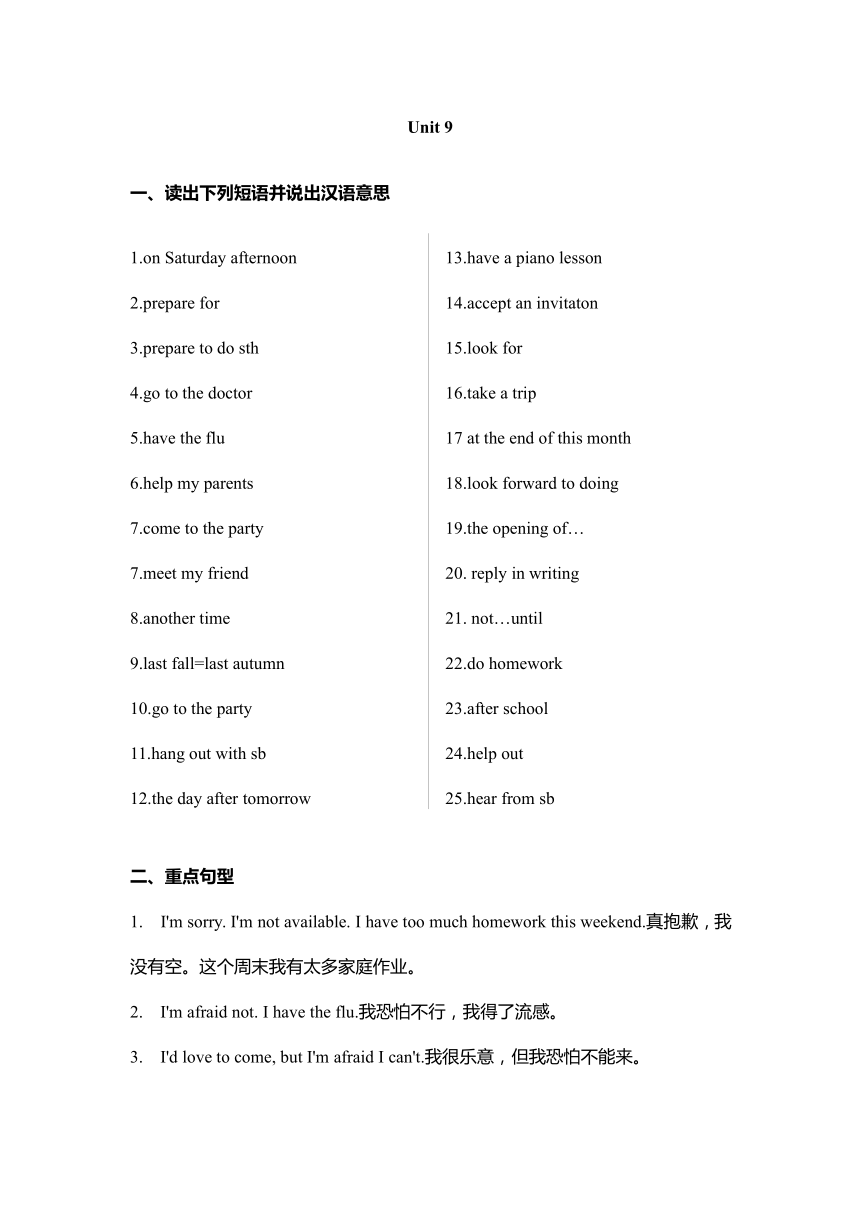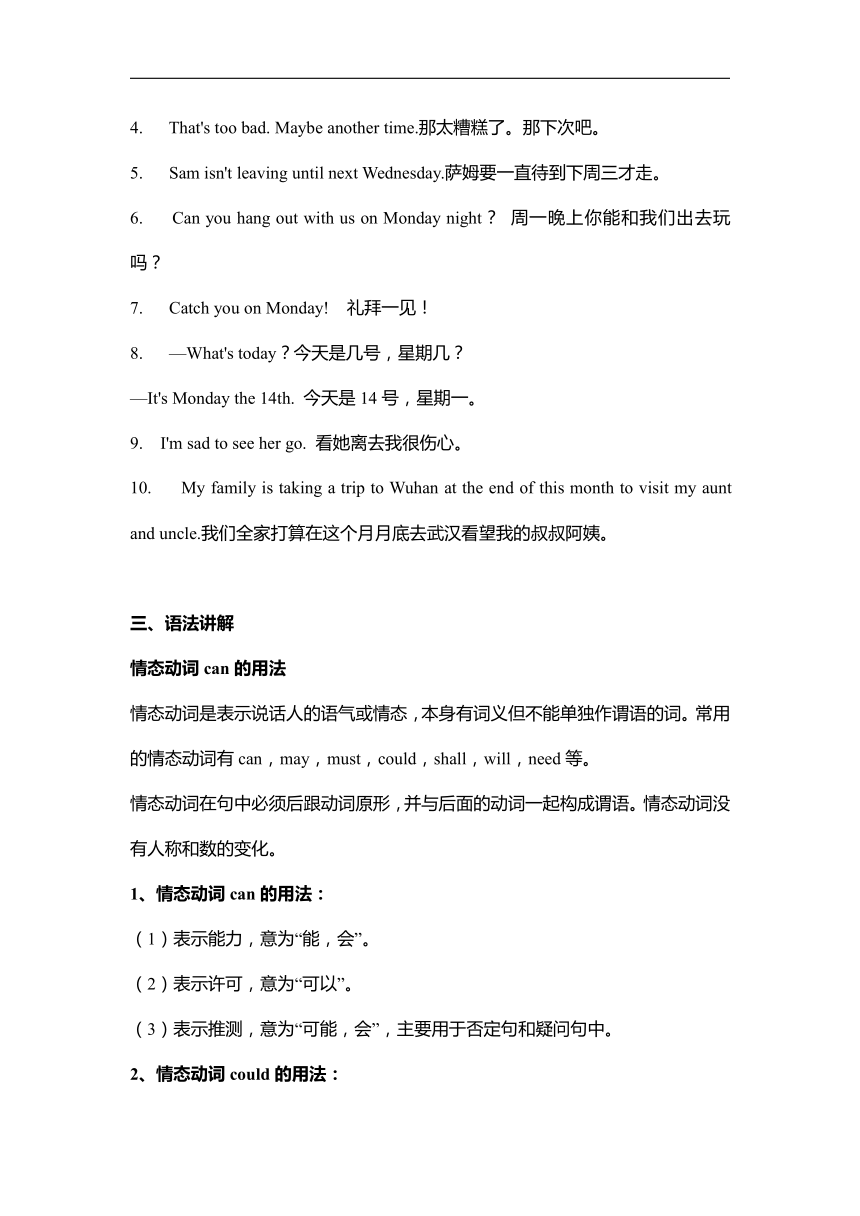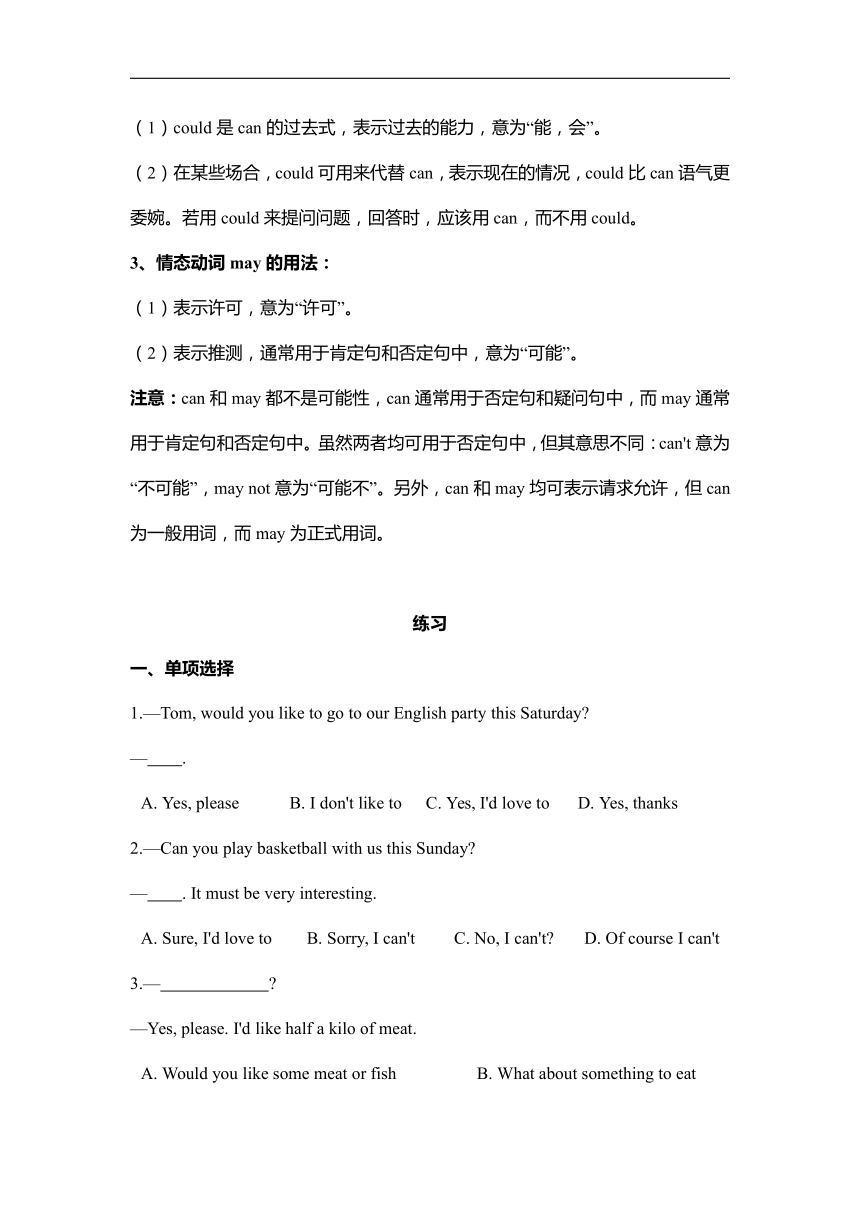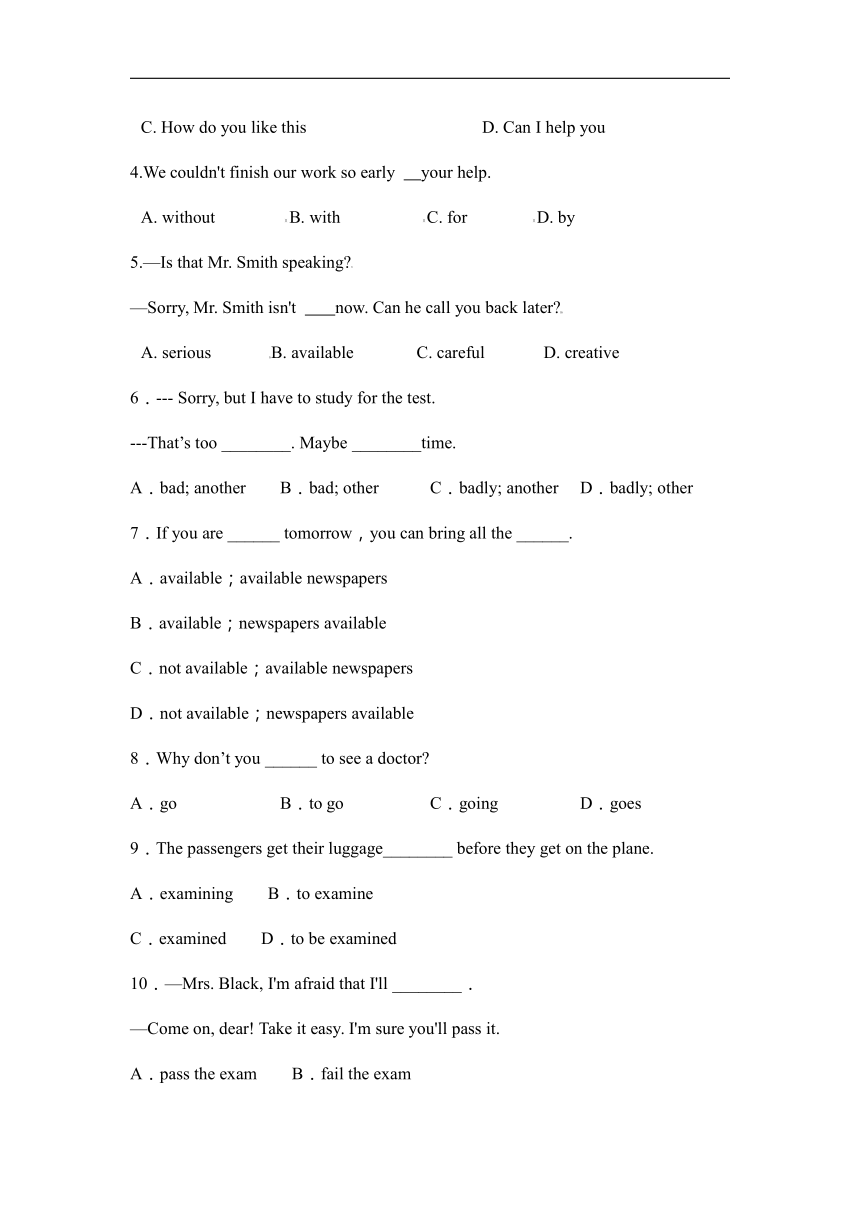2023-2024学年人教版英语八年级上册Unit 9Can you come to my party? 基础知识汇总练习 (无答案)
文档属性
| 名称 | 2023-2024学年人教版英语八年级上册Unit 9Can you come to my party? 基础知识汇总练习 (无答案) |  | |
| 格式 | docx | ||
| 文件大小 | 31.0KB | ||
| 资源类型 | 教案 | ||
| 版本资源 | 人教新目标(Go for it)版 | ||
| 科目 | 英语 | ||
| 更新时间 | 2023-12-14 15:50:02 | ||
图片预览




文档简介
Unit 9
一、读出下列短语并说出汉语意思
on Saturday afternoon
prepare for
prepare to do sth
go to the doctor
have the flu
help my parents
come to the party
7.meet my friend
8.another time
9.last fall=last autumn
10.go to the party
11.hang out with sb
12.the day after tomorrow
13.have a piano lesson
14.accept an invitaton
15.look for
16.take a trip
17 at the end of this month
18.look forward to doing
19.the opening of…
20. reply in writing
21. not…until
22.do homework
23.after school
24.help out
25.hear from sb
二、重点句型
1. I'm sorry. I'm not available. I have too much homework this weekend.真抱歉,我没有空。这个周末我有太多家庭作业。
2. I'm afraid not. I have the flu.我恐怕不行,我得了流感。
3. I'd love to come, but I'm afraid I can't.我很乐意,但我恐怕不能来。
4. That's too bad. Maybe another time.那太糟糕了。那下次吧。
5. Sam isn't leaving until next Wednesday.萨姆要一直待到下周三才走。
6. Can you hang out with us on Monday night? 周一晚上你能和我们出去玩吗?
7. Catch you on Monday! 礼拜一见!
8. —What's today?今天是几号,星期几?
—It's Monday the 14th. 今天是14号,星期一。
9. I'm sad to see her go. 看她离去我很伤心。
10. My family is taking a trip to Wuhan at the end of this month to visit my aunt and uncle.我们全家打算在这个月月底去武汉看望我的叔叔阿姨。
三、语法讲解
情态动词can的用法
情态动词是表示说话人的语气或情态,本身有词义但不能单独作谓语的词。常用的情态动词有can,may,must,could,shall,will,need等。
情态动词在句中必须后跟动词原形,并与后面的动词一起构成谓语。情态动词没有人称和数的变化。
情态动词can的用法:
表示能力,意为“能,会”。
表示许可,意为“可以”。
表示推测,意为“可能,会”,主要用于否定句和疑问句中。
情态动词could的用法:
could是can的过去式,表示过去的能力,意为“能,会”。
在某些场合,could可用来代替can,表示现在的情况,could比can语气更委婉。若用could来提问问题,回答时,应该用can,而不用could。
情态动词may的用法:
表示许可,意为“许可”。
表示推测,通常用于肯定句和否定句中,意为“可能”。
注意:can和may都不是可能性,can通常用于否定句和疑问句中,而may通常用于肯定句和否定句中。虽然两者均可用于否定句中,但其意思不同:can't意为“不可能”,may not意为“可能不”。另外,can和may均可表示请求允许,但can为一般用词,而may为正式用词。
练习
一、单项选择
1.—Tom, would you like to go to our English party this Saturday
— .
A. Yes, please B. I don't like to C. Yes, I'd love to D. Yes, thanks
2.—Can you play basketball with us this Sunday
— . It must be very interesting.
A. Sure, I'd love to B. Sorry, I can't C. No, I can't D. Of course I can't
3.—
—Yes, please. I'd like half a kilo of meat.
A. Would you like some meat or fish B. What about something to eat
C. How do you like this D. Can I help you
4.We couldn't finish our work so early your help.
A. without B. with C. for D. by
5.—Is that Mr. Smith speaking
—Sorry, Mr. Smith isn't now. Can he call you back later
A. serious B. available C. careful D. creative
6.--- Sorry, but I have to study for the test.
---That’s too ________. Maybe ________time.
A.bad; another B.bad; other C.badly; another D.badly; other
7.If you are ______ tomorrow,you can bring all the ______.
A.available;available newspapers
B.available;newspapers available
C.not available;available newspapers
D.not available;newspapers available
8.Why don’t you ______ to see a doctor
A.go B.to go C.going D.goes
9.The passengers get their luggage________ before they get on the plane.
A.examining B.to examine
C.examined D.to be examined
10.—Mrs. Black, I'm afraid that I'll ________.
—Come on, dear! Take it easy. I'm sure you'll pass it.
A.pass the exam B.fail the exam
C.passed the exam D.failed the exam
二、完型
The surprise party is very popular in America. Most people in America think it is very exciting to have surprise parties ____1____ their good friends or family members. It is quite easy to ____2____ a surprise party when one’s birthday is coming. Do you want to know ____3____ a surprise party is like Look at the following example. It’s night. Bob’s wife asks him to go downstairs to the kitchen and ____4____ her a glass of milk. Bob walks to the kitchen and pushes ____5____ open. There’s ____6____ sound or light there. Suddenly he hears a strange (奇怪的) sound and then sees a bear standing in front of him! Bob is very scared and falls backwards. The bear ____7____ his costume. It’s Bob’s friend Charles! There are also several people behind Charles, including his wife. ____8____ of them say to Bob, “Surprise!! Who!!” Bob is puzzled, and he does not know what it is ____9____ his friends say “Happy Birthday” to him.
In fact, the surprise party has many kinds of forms. A ____10____ surprise party always makes people feel surprised and excited. Everyone enjoys themselves at the party.
1.A.to B.for C.at D.in
2.A.plan B.do C.join D.eat
3.A.why B.how C.who D.what
4.A.carry B.take C.bring D.move
5.A.the window B.the door C.the floor D.the room
6.A.no B.lot C.much D.plenty
7.A.looks after B.takes off C.puts on D.gives away
8.A.No one B.Both C.Neither D.All
9.A.if B.until C.so D.but
10.A.polite B.difficult C.successful D.Lucky
三、用所给单词的正确形式填空
1.He had to _________(walk)to school because his bike was broken.
2.I'm looking forward to _________(receive)your letter.
3.You shouldn't refuse _________(help)others.
4.When your mother sees your picture,she will feel _________(surprise).
5.We want to have a surprise party for our mother without _________(tell)her.
6.Thanks for________(help)us.
7.He often goes bike________(ride) on Tuesday.
8.Next week we_________________(be)in Zhejiang.
9.Last fall he________(leave)Wuhan.
10.He would love________(come)to Ann's birthday party.
四、根据汉语意思,完成句子。
1.你不在家时, 我会照顾孩子们。
While you are not at home, I'll _________ _____________the children.
2.“周一晚上你能和我们一起闲逛吗 ”“当然!周一见!”
—Can you ______ ______ ______ us on Monday night —Sure! ______ _____ on Monday!
3.我盼望着收到你们的来信。
I look forward to ______ ______ you all.
4.我们的老师后天将回美国。
Our teacher will go back to the US______ ______ ______ ______.
5.陈翔打算在2016年的年初去旅行吗?
Does Chen Xiang plan to _____ _____ _____ at the beginning of 2016
6.昨天我患了流行性感冒。
I _________ _________ _________ yesterday.
7.杰克明天将要离开北京去天津。
Jack is _________ Beijing _________ Tianjin tomorrow.
8.现在我很忙,其他时间可以。
I'm busy now. _________ _________ is OK.
9.他正在为他的生日聚会做准备。
He is _________ _________ his birthday party.
10.昨天他和他的朋友在公园里闲逛了。
He _________ _________ with his friends in the park yesterday
五、句型转换
1.Sorry, I have to refuse your invitation.(同义句)
Sorry, I have to __________ __________your invitation.
2. Today is December the 29th. (划线部分提问)
__________ is the __________today
3. Jack can’t play the computer games before he finishes his homework. (同义句)
Jack __________ play the computer games __________ he finishes his homework.
Jack __________play the computer games __________ he finishes his homework.
4.Thanks for asking. (同义句)
Thanks for __________ me./ Thanks for your __________.
5.I heard from my uncle yesterday. (同义句)
I __________a letter __________ my uncle yesterday.
一、读出下列短语并说出汉语意思
on Saturday afternoon
prepare for
prepare to do sth
go to the doctor
have the flu
help my parents
come to the party
7.meet my friend
8.another time
9.last fall=last autumn
10.go to the party
11.hang out with sb
12.the day after tomorrow
13.have a piano lesson
14.accept an invitaton
15.look for
16.take a trip
17 at the end of this month
18.look forward to doing
19.the opening of…
20. reply in writing
21. not…until
22.do homework
23.after school
24.help out
25.hear from sb
二、重点句型
1. I'm sorry. I'm not available. I have too much homework this weekend.真抱歉,我没有空。这个周末我有太多家庭作业。
2. I'm afraid not. I have the flu.我恐怕不行,我得了流感。
3. I'd love to come, but I'm afraid I can't.我很乐意,但我恐怕不能来。
4. That's too bad. Maybe another time.那太糟糕了。那下次吧。
5. Sam isn't leaving until next Wednesday.萨姆要一直待到下周三才走。
6. Can you hang out with us on Monday night? 周一晚上你能和我们出去玩吗?
7. Catch you on Monday! 礼拜一见!
8. —What's today?今天是几号,星期几?
—It's Monday the 14th. 今天是14号,星期一。
9. I'm sad to see her go. 看她离去我很伤心。
10. My family is taking a trip to Wuhan at the end of this month to visit my aunt and uncle.我们全家打算在这个月月底去武汉看望我的叔叔阿姨。
三、语法讲解
情态动词can的用法
情态动词是表示说话人的语气或情态,本身有词义但不能单独作谓语的词。常用的情态动词有can,may,must,could,shall,will,need等。
情态动词在句中必须后跟动词原形,并与后面的动词一起构成谓语。情态动词没有人称和数的变化。
情态动词can的用法:
表示能力,意为“能,会”。
表示许可,意为“可以”。
表示推测,意为“可能,会”,主要用于否定句和疑问句中。
情态动词could的用法:
could是can的过去式,表示过去的能力,意为“能,会”。
在某些场合,could可用来代替can,表示现在的情况,could比can语气更委婉。若用could来提问问题,回答时,应该用can,而不用could。
情态动词may的用法:
表示许可,意为“许可”。
表示推测,通常用于肯定句和否定句中,意为“可能”。
注意:can和may都不是可能性,can通常用于否定句和疑问句中,而may通常用于肯定句和否定句中。虽然两者均可用于否定句中,但其意思不同:can't意为“不可能”,may not意为“可能不”。另外,can和may均可表示请求允许,但can为一般用词,而may为正式用词。
练习
一、单项选择
1.—Tom, would you like to go to our English party this Saturday
— .
A. Yes, please B. I don't like to C. Yes, I'd love to D. Yes, thanks
2.—Can you play basketball with us this Sunday
— . It must be very interesting.
A. Sure, I'd love to B. Sorry, I can't C. No, I can't D. Of course I can't
3.—
—Yes, please. I'd like half a kilo of meat.
A. Would you like some meat or fish B. What about something to eat
C. How do you like this D. Can I help you
4.We couldn't finish our work so early your help.
A. without B. with C. for D. by
5.—Is that Mr. Smith speaking
—Sorry, Mr. Smith isn't now. Can he call you back later
A. serious B. available C. careful D. creative
6.--- Sorry, but I have to study for the test.
---That’s too ________. Maybe ________time.
A.bad; another B.bad; other C.badly; another D.badly; other
7.If you are ______ tomorrow,you can bring all the ______.
A.available;available newspapers
B.available;newspapers available
C.not available;available newspapers
D.not available;newspapers available
8.Why don’t you ______ to see a doctor
A.go B.to go C.going D.goes
9.The passengers get their luggage________ before they get on the plane.
A.examining B.to examine
C.examined D.to be examined
10.—Mrs. Black, I'm afraid that I'll ________.
—Come on, dear! Take it easy. I'm sure you'll pass it.
A.pass the exam B.fail the exam
C.passed the exam D.failed the exam
二、完型
The surprise party is very popular in America. Most people in America think it is very exciting to have surprise parties ____1____ their good friends or family members. It is quite easy to ____2____ a surprise party when one’s birthday is coming. Do you want to know ____3____ a surprise party is like Look at the following example. It’s night. Bob’s wife asks him to go downstairs to the kitchen and ____4____ her a glass of milk. Bob walks to the kitchen and pushes ____5____ open. There’s ____6____ sound or light there. Suddenly he hears a strange (奇怪的) sound and then sees a bear standing in front of him! Bob is very scared and falls backwards. The bear ____7____ his costume. It’s Bob’s friend Charles! There are also several people behind Charles, including his wife. ____8____ of them say to Bob, “Surprise!! Who!!” Bob is puzzled, and he does not know what it is ____9____ his friends say “Happy Birthday” to him.
In fact, the surprise party has many kinds of forms. A ____10____ surprise party always makes people feel surprised and excited. Everyone enjoys themselves at the party.
1.A.to B.for C.at D.in
2.A.plan B.do C.join D.eat
3.A.why B.how C.who D.what
4.A.carry B.take C.bring D.move
5.A.the window B.the door C.the floor D.the room
6.A.no B.lot C.much D.plenty
7.A.looks after B.takes off C.puts on D.gives away
8.A.No one B.Both C.Neither D.All
9.A.if B.until C.so D.but
10.A.polite B.difficult C.successful D.Lucky
三、用所给单词的正确形式填空
1.He had to _________(walk)to school because his bike was broken.
2.I'm looking forward to _________(receive)your letter.
3.You shouldn't refuse _________(help)others.
4.When your mother sees your picture,she will feel _________(surprise).
5.We want to have a surprise party for our mother without _________(tell)her.
6.Thanks for________(help)us.
7.He often goes bike________(ride) on Tuesday.
8.Next week we_________________(be)in Zhejiang.
9.Last fall he________(leave)Wuhan.
10.He would love________(come)to Ann's birthday party.
四、根据汉语意思,完成句子。
1.你不在家时, 我会照顾孩子们。
While you are not at home, I'll _________ _____________the children.
2.“周一晚上你能和我们一起闲逛吗 ”“当然!周一见!”
—Can you ______ ______ ______ us on Monday night —Sure! ______ _____ on Monday!
3.我盼望着收到你们的来信。
I look forward to ______ ______ you all.
4.我们的老师后天将回美国。
Our teacher will go back to the US______ ______ ______ ______.
5.陈翔打算在2016年的年初去旅行吗?
Does Chen Xiang plan to _____ _____ _____ at the beginning of 2016
6.昨天我患了流行性感冒。
I _________ _________ _________ yesterday.
7.杰克明天将要离开北京去天津。
Jack is _________ Beijing _________ Tianjin tomorrow.
8.现在我很忙,其他时间可以。
I'm busy now. _________ _________ is OK.
9.他正在为他的生日聚会做准备。
He is _________ _________ his birthday party.
10.昨天他和他的朋友在公园里闲逛了。
He _________ _________ with his friends in the park yesterday
五、句型转换
1.Sorry, I have to refuse your invitation.(同义句)
Sorry, I have to __________ __________your invitation.
2. Today is December the 29th. (划线部分提问)
__________ is the __________today
3. Jack can’t play the computer games before he finishes his homework. (同义句)
Jack __________ play the computer games __________ he finishes his homework.
Jack __________play the computer games __________ he finishes his homework.
4.Thanks for asking. (同义句)
Thanks for __________ me./ Thanks for your __________.
5.I heard from my uncle yesterday. (同义句)
I __________a letter __________ my uncle yesterday.
同课章节目录
- Unit 1 Where did you go on vacation?
- Section A
- Section B
- Unit 2 How often do you exercise?
- Section A
- Section B
- Unit 3 I'm more outgoing than my sister.
- Section A
- Section B
- Unit 4 What's the best movie theater?
- Section A
- Section B
- Unit 5 Do you want to watch a game show?
- Section A
- Section B
- Unit 6 I'm going to study computer science.
- Section A
- Section B
- Unit 7 Will people have robots?
- Section A
- Section B
- Unit 8 How do you make a banana milk shake?
- Section A
- Section B
- Unit 9 Can you come to my party?
- Section A
- Section B
- Unit 10 If you go to the party, you'll have a grea
- Section A
- Section B
